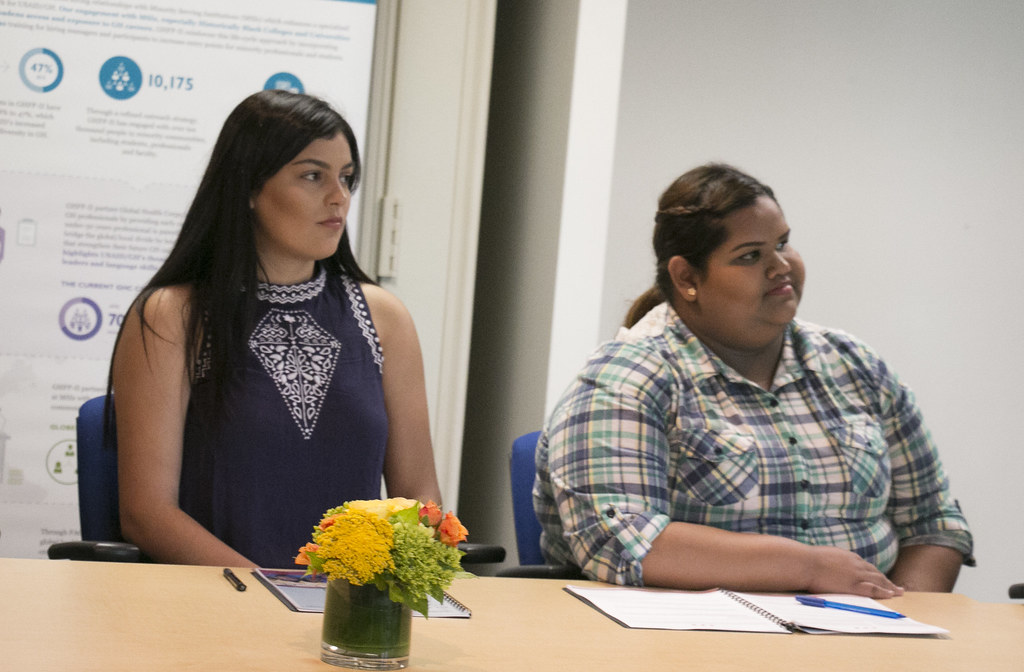In June 2016, twelve FACES for the Future students, each representing a FACES program from across California (San Diego, Hayward, San Francisco and Oakland), traveled to Washington DC to participate in our inaugural Global Health Youth Summit (GHYS).
This extraordinary Summit was developed and implemented in partnership and collaboration with the Global Health Fellows Program-II (GHFP-II), a fellow project of the Public Health Institute. The GHYS was created with the intention to inspire FACES students to pursue careers in global health, thereby helping to build the next generation of diverse global health professionals.
FACES students traveled to Washington DC to learn directly from USAID professionals about global health careers, and to gain an appreciation for the intricacies and opportunities of global health work. All students acquired a deeper understanding of global health and completed the program with a stronger desire to work in global health professions. They also developed a better sense of where their skills and interests might fit in. FACES students participated in an array of educational activities, including a college tour, a conversation with college representatives from GlobeMed, and speed mentoring and simulation activities with staff and fellows from the USAID and GHFP-II. Students made important connections and had the opportunity to build their networks in global health.
The Summit was an extraordinarily impactful and powerful experience for all involved. Many students expressed that it was one of the most transformative experiences of their lives. The FACES Coalition thanks everyone who made this opportunity possible, and most especially to our partners at the Global Health Fellows Program-II.
Student Blogs
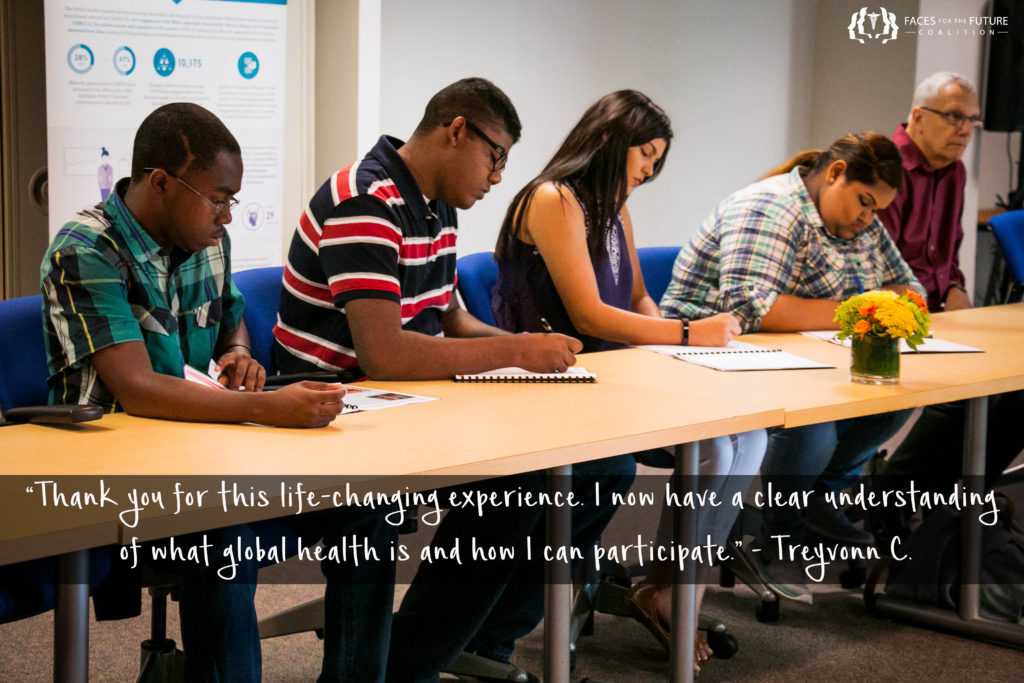
Treyvonn’s’s Blog
The Global Health Youth Summit definitely accomplished its mission of giving teens like me a new perspective on life goals and opening up doors that we didn’t even know existed. It gives me great pleasure to say that I was one of twelve students to visit Washington, DC to listen, learn, and interact with leaders from the US Agency for International Development and the GHFP-II. On this life changing trip, I learned about the importance of networking and being proactive in the constant progression of my life, community, and even the world. I’ve learned that my voice and interests, in a sea of voices and interests, count for something, and that if I want to be a part of global change, it is up to me.
I think that the one key things that future students could learn from this opportunity is that there are so many different layers of global health. What most of us didn’t realize was that global health does not and cannot solely rely on the medical field. During the trip, we had the chance to speak to people that hold a variety of different professions, such as security specialists, management and program analysts, and even the Director of the USAID Office of Civil Rights and Diversity, just to name a few.
I learned that when thinking about a career in global health, I must first figure out what I like to do, what I’m good at, and definitely what I’m passionate about. There are many professions in the field of global health that align with my personal interests. Dr. Ticora Jones, the HESN Division Chief, said to us, “Take stock in the experiences you’ve had and try to contribute that to what you are doing. Remember how you felt when you had those experiences.”
The Global Health Youth Summit was one of the most interesting and informative experiences of my life. However, the most inspiring thing to me was that when I looked around the room at all the students and even the speakers, I saw ordinary people who cared about the world and their communities so much that they felt an obligation to help.
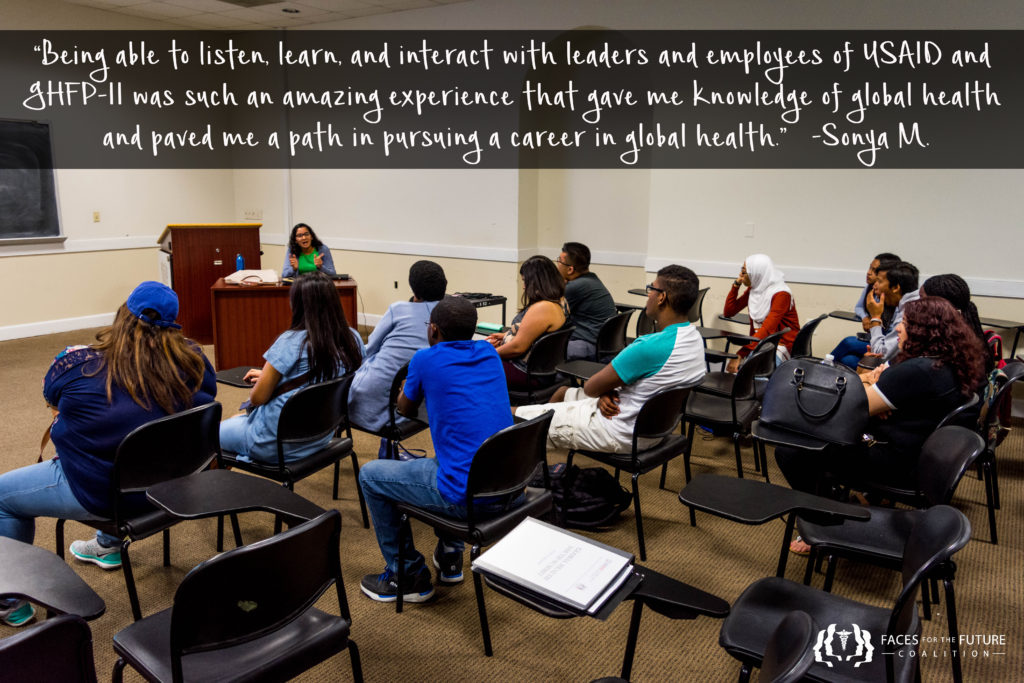
Sonya’s Blog
I am a graduate of FACES for the Future Hayward and Castro Valley High School in California. I am honored to be able to say that I was one of the twelve students to visit Washington, DC to gain exposure to the field of global health. Through the Global Health Youth Summit, I was able to make connections between health in my local community and health around the world. I was able to see links between the skills and competencies that I learned through FACES and a potential future global health career with the USAID. On this trip, I learned about the importance of networking, being proactive with the constant changes going on around me in the world, and being open minded. Being able to listen, learn, and interact with leaders and employees of the USAID and GHFP-II was such an amazing experience because it gave me knowledge about global health and helped pave a path for me to pursue a career in global health.
In order for me to pursue a career in global health, I learned that I need to start branching out my career goals and start choosing the right classes to take in college that expose me to global health. I learned that I and other students have important talents that we can bring to the global health workforce, including our fresh ideas and perspectives and the ability to better understand the health issues and concerns of populations around the world.
I think that when considering a career in global health, youth should keep in mind that not only can you just help your own community, but you can help the world. I know that sounds crazy to say, but it’s totally true. Choosing a career in global health matters because you can make a difference and help those in need.
Before going to Washington DC, I did not know what to expect at all. When I completed this trip, I was fully aware of what global health is and the mission of global health workers. I am now determined to be a global health worker. This program opened up many doors for me and my fellow peers to pursue a career with global health. Not a lot of teenagers can say they went to DC to see such wonderful monuments and meet such wonderful people who are so passionate about what they do in the global health field. I am truly thankful to say that I did!
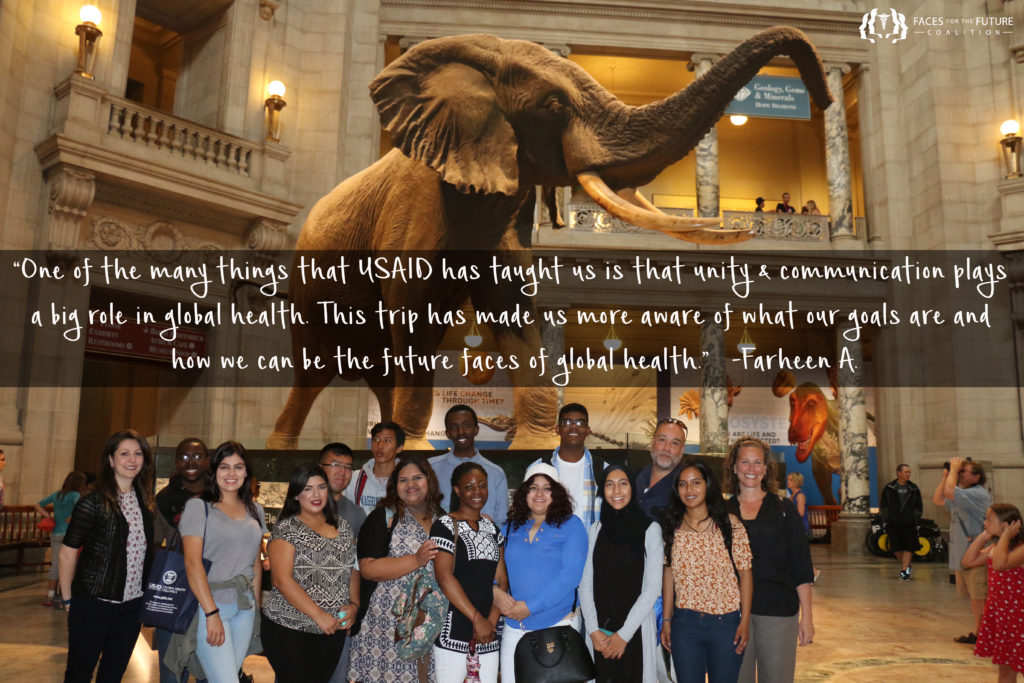
Farheen’s Blog
I am a high school student, going into my senior year, and like most young people who want to be medical professionals, I am deeply concerned with the well being of others. In my junior year I began interning at a hospital with the help of FACES for the Future program, and a few months later, I was selected to participate in a once-in-a-lifetime opportunity to participate in the Global Health Youth Summit in Washington, DC led by the Global Health Fellows Program (GHFP) II. These two opportunities have inspired me to explore a life dedicated to solving some of the greatest challenges of global health, and to encourage my peers to get excited about global health as well.
Before going to the Summit, I did not know anything about global health or the issues associated with it. Yet after the Summit, global health has become an interest of mine because it is about giving back to a world and people that have given us so much. Something that I learned from the Global Health Youth Summit is that people from diverse backgrounds, with their own talents and sets of skills, can unite to accomplish the same goal. I believe everyone has talents that can benefit others and that we have an obligation to use these skills and talents to help those who are suffering. As a young person, it may seem a little difficult to see where you can start making a difference, but getting involved in global health organizations and interning in healthcare facilities is a great start.
There has been a massive change in me because of the Global Health Youth Summit. I am even more passionate about making change and giving people chances to accomplish their dreams. Global health may seem like a boring subject to many young people because we might think it does not have anything to do with us. While it may not be us struggling with health issues, trying to survive deadly diseases, and trying to be emotionally stable, what if it were us instead? Wouldn’t we want someone to help us? There are many students like me who have the same energy and passion for their goals. I want to let them know that they can use that energy and passion to help others.
During the trip we discussed our own ambitions; mine is to become an anesthesiologist. Dr. Tomás Magaña, the Program Director of FACES for the Future, said to us in a workshop: “Once you become something in your respective professions, and you practice that every single day of your life, it might start to get boring in a few years. How great would it be to work in different countries and to experience helping with new diseases and issues?” When he said that, I realized that you have to work toward something that brings a direction to your passion. Because of the Global Health Youth Summit, I learned that I get attached to the people around me quickly, and that I care deeply for other people. I also realized that I have many hidden skills and talents, and all I needed was a direction. Before even taking a first step and doubting it, I learned that I should believe in myself and have faith in the decisions I make, because in the end, I have the power to create my own future.
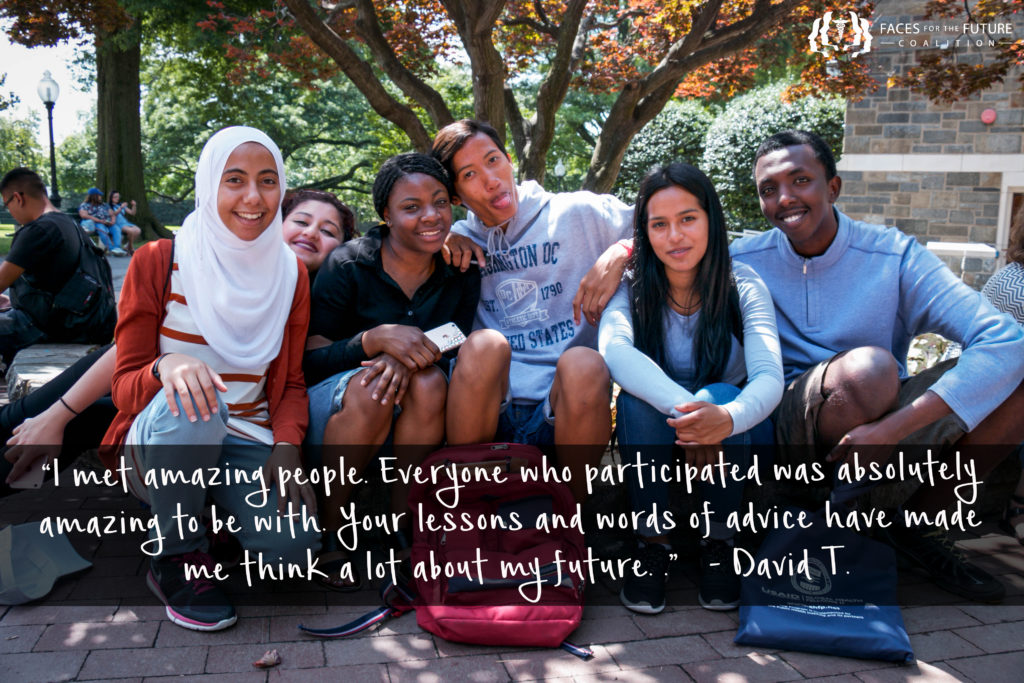
David’s Blog
The Global Health Youth Summit allowed students like me, who are part of the FACES for the Future program, to travel to Washington, DC and learn more about global health. Washington, DC, what an exciting adventure! We were taught the fundamentals of global health, met global health professionals, and did a little sightseeing, of course. I learned that global health is a field in which people look for ways to improve the health and well-being of populations on a global scale. They can do this in a number of ways–controlling diseases, improving medical opportunities for those in need, and finding ways for families to sustain themselves with enough food and water are just a few of the possibilities. There are many different aspects of global health and it isn’t exclusively a medical field. The field of global health is extremely broad, comprised of professionals from various disciplines who have a similar interest: they want to help out and make a difference. Accountants have a place in global health. Teachers, engineers, and statisticians can become global health professionals as well! It is surprising how large the global health field actually is and how many ways there are to contribute.
On the trip, we also met mentors who are already working in the global health field, they included Fellows and Interns of the Global Health Fellows Program II (GHFP-II) and staff members of the US Agency for International Development (USAID). The mentors were amazing to talk to and gave such wise advice. One such mentor was Dr. Ticora Jones, from USAID’s Global Development Lab. She shared with us that we should think about the places we’ll go, who we’ll connect with, and how that can help us grow. Talking to my mentors changed my perspective about my future. Before going on the trip, I was quite undecided about what I wanted to do as a future career. I considered becoming a surgeon, possibly with a focus in neurology, but I also have an interest in the military. My mentors showed me options that I never knew about, like gaining global health experience during gap year – the time between undergraduate and more advanced education. They inspired me to spend that time giving back to the global community, and even to think about joining the Peace Corps where I would gain relevant experience working in a developing country with many different organizations and people.
The Global Health Youth Summit trip allowed me to meet so many amazing people, and learn so much. We toured the National Mall (which we were surprised to find out was not a shopping mall) and we went to the Smithsonian Museum of Natural History. But most important, we had the opportunity to talk to professionals from USAID. Their stories and experiences helped me not only to learn more about global health, but more about myself. They taught me this: Don’t worry. Don’t worry about what the future will bring. Don’t stress out. I learned that I should not think of myself as incapable, because many of the things that the working world expects from me are characteristics that I already possess. I learned that I have the ability to be flexible and adaptable, and to work in a team. I have creativity, ingenuity, communication skills, and the ability to solve problems. These are all things that I practice in my daily life, and these skills will make me an amazing global health professional.
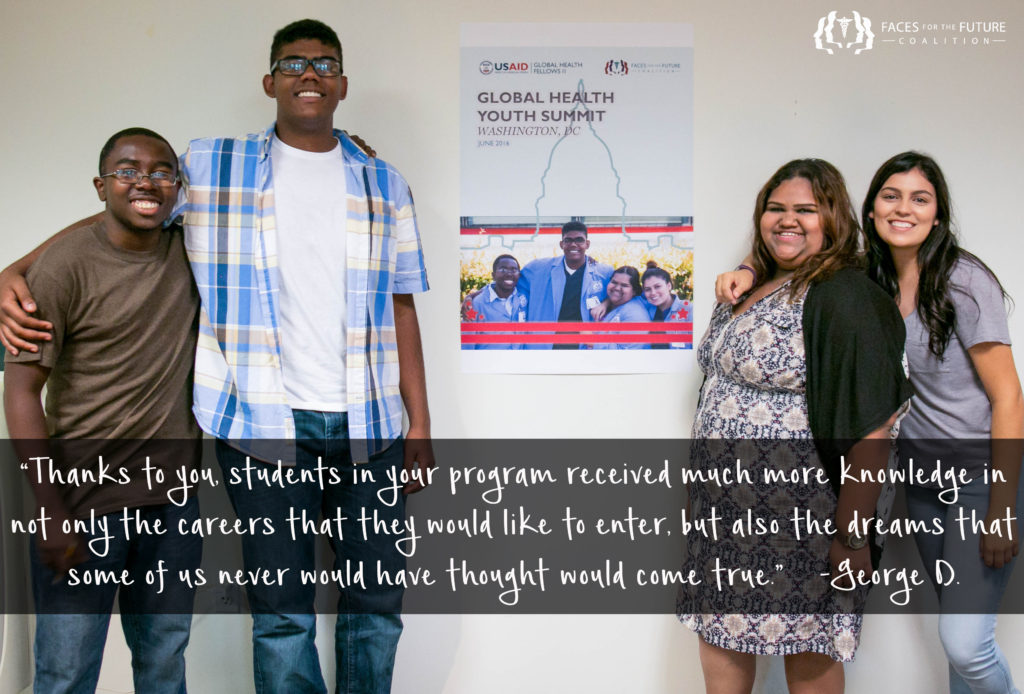
George’s Blog
My name is George, and I am a FACES for the Future Health Scholar from the FACES group in Hayward, California. I was born in Hayward and have lived there my whole life. I’ve wanted to be in the health field since I was little but I never knew what specific area of health I wanted to enter. Once I heard about the FACES for the Future program, I was eager to apply because I felt it would provide me with vital experiences and knowledge that I would need for my future career options. After I was accepted into the program I was presented with another great opportunity, to go to Washington, DC and participate in the Global Health Youth Summit. I didn’t know much about global health but I was excited to learn about the new career path that I might want to follow. Fortunately, I was accepted to go on the trip, and I can honestly say that it was one of the most important, fulfilling, and overall fun experiences of my life.
While in Washington, DC, I had the opportunity to learn about the many different aspects of global health. I met global health workers and heard about their various experiences working around the world, participated in several educational workshops, and did some really fun sightseeing. The trip was spread across five days, but each day was filled with so many experiences that it felt a lot longer than that, although I do wish that we could have stayed even longer.
We started the Summit with an orientation to the Global Health Fellows Program-II. The Fellows all seemed so happy to see us, and I was inspired by the way that they saw our potential to do great things and be very successful later in life. At this first meeting, we learned more about GHFP-II and the US Agency for International Development (USAID), each organization’s purpose, and their effect on the world. We also participated in a flash mentoring session that gave us a chance to meet real global health workers that have been traveling around the world to solve various issues.
One global health professional that I was particularly interested in meeting was a worker in the field of the LGBTQI community. He spoke about the work he does to protect people of the LGBTQI community globally. One reason why I feel so inspired by his work is that it’s not the safest thing to do, but he still does it because it’s important and he strongly believes in it. Because the issue is international, there are a lot of violent retaliations that could very likely occur, especially in countries that aren’t as accepting as others. I enjoyed hearing about his strategic use of communication in those places to help people in need, while protecting their anonymity for safety purposes. One of his roles is to work with various offices and bureaus to help promote awareness for the issue of discrimination of the LGBTQI community. This worker was just one of many who shared his amazing story and path with us individually. In my opinion, the flash mentoring was one of the most eye-opening and important experiences I had while on the trip.
Another highlight of the trip was a group activity meant to teach us how hard it can be to work with minimal resources, like a global health worker often has to do. It required us to work together, on building a community playground, and use one another’s resources to achieve a common goal. It was a little difficult at first, but I think we all learned a lot about the value of collaboration and compromise from this activity.
The rest of the Summit included a campus tour of Georgetown University, a visit to the Smithsonian Museum of Natural History, and seeing the National Mall for the first time. I got very well acquainted with my peers and learned a lot about myself too. We also had a chance to learn about social media and blogging. I found it fascinating how the use of social media can be so effective when trying to spread awareness about an issue.
By the time we had our closing ceremony, I felt really accomplished, but at the same time, it was really hard to say goodbye to my new peers and the wonderful mentors that we met. We gained so much from the trip, and I’m sure we all had the experience of a lifetime. From the trip, I learned that the global health field has no limits. There are so many different aspects and departments of global health, and I feel really lucky to have learned about so many of them. This program mattered to me because it helped me to narrow down what I want to do for a career, which is something I’ve been trying to do for a long time. I feel that the Summit can help many other students with the same problem. For me, it was one of the most special opportunities of my life.
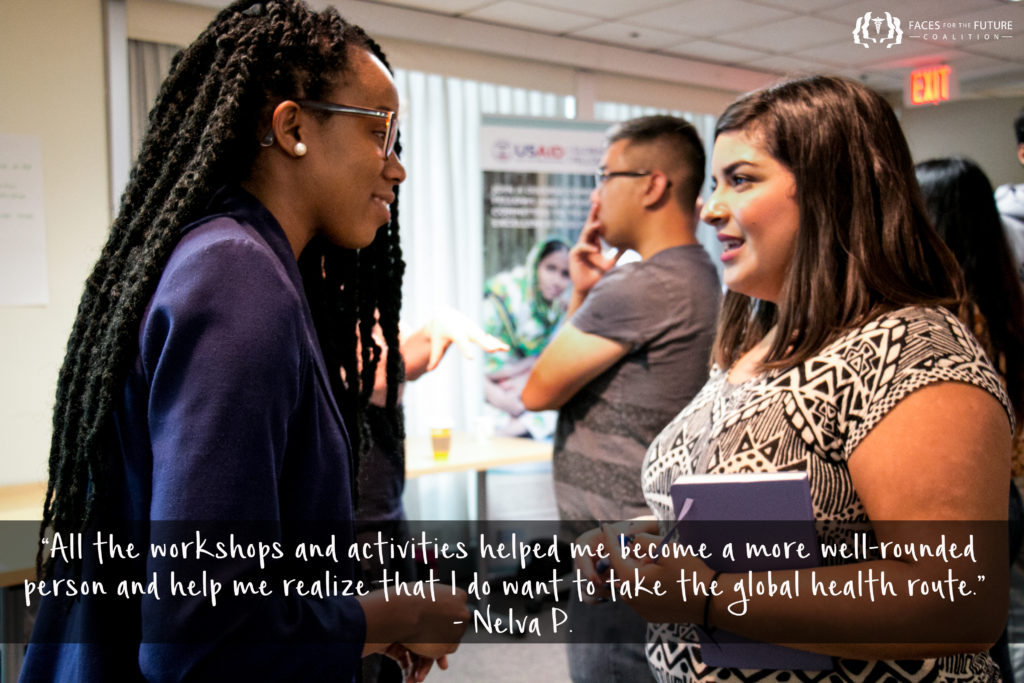
Nelva’s Blog
Globalization has connected countries around the world. Just as countries are connected through trade, they are also connected through health issues. Global health should not only be an interest among college students or adults, it should matter to high school students too. I was able to attend the first Global Health Youth Summit thanks to FACES for the Future, Global Health Fellows Program-II, and USAID that educated and helped me reinforce my love and passion for helping people around the world. I believe that the topic of global health needs to be more accessible to high school students and youth as they bring diversity and quality to the field.
The United States is a melting pot. Immigrants from different backgrounds bring their customs and culture to contribute to the country. These unique aspects of each culture help the United States prosper because immigrants and minorities can offer different solutions to problems. I learned that the global health workforce cannot be successful if diversity is not considered. If every global health worker grew up in the same neighborhood and got the same education, most likely they would come up with similar solutions to problems that happen abroad. However, when we incorporate a Latino worker that was raised in the inner-city with a Caucasian raised in the suburbs, they both contribute from their own knowledge and experiences to deliver quality health services. The inclusion of diverse voices in global health is crucial and it should be deliberately implemented.
Being a Latina lady myself who just graduated high school, I share and have self-acquired qualities and skills that I feel will impact the world and my career in global health in a positive way. I am bilingual in English and Spanish, but hope to learn more languages so that I can help people better by speaking and understanding their language and culture. The fact that I know a second language helps to remove the barrier of not comprehending what the people I am helping are trying to say. Another skill that I exhibit is knowing how to bargain and prioritize. This is something that I learned as a little girl. My mother would tell me that if I completed my house chores she would buy me a doll by the end of the month, but I knew that if I dedicated myself to completing the chores I would spend less time working on my homework, and this would eventually affect my future. I prioritized my homework and then bargained with my mother to compromise on doing only some chores and being awarded a happy meal instead of the doll. These skills are important and can be put into practice abroad to make a positive impact.
High school students, not just college students and older people, need to have the opportunity of being introduced and welcomed to global health. Why? Because high school students start developing their goals and aspirations at this age. If students are not exposed to the opportunity learn more about this field, not only do the students lose, but global health loses as well. Global health loses innovators. Global health loses the interest of the younger generations. Global health loses the generations that in the future will be in charge of the whole workforce. If younger generations like high school students do not have opportunities like the Global Health Youth Summit, the mission of global health will not be accomplished.
Global health leaders need to support programs and initiatives like these because youth are the future. We are the future of the United States. We are the future of global health. We are the ones that will continue to give aid fifty years from now. Global health leaders have to support these programs because they open the eyes of the younger generations and show them that there is a whole different world in health other than working at a hospital in the United States. As global health leaders invest in high school students, they are unconsciously recruiting new global health workers and giving them confidence when deciding to follow global health.
During the week that I spent along with other FACES for the Future students in Washington D.C. being educated in global health, I was transformed. The Global Health Youth Summit inspired and motivated me to pursue global health. I want to be a global health provider. Whether I am needed as a physician for medical practice or microbiologist for research, I hope to get involved with this field that needs more diversity. While speaking to GHFP-II Fellows and interacting through the different presentations, I realized that the skills needed to be a successful global health worker are skills I already have. All I need is to complete the educational requirements that will make me eligible to work for the different organizations.
FACES for the Future students along with other high school students need this opportunity to learn about global health. The world today is intertwined and all the catastrophes or successes that happen around the world is felt no matter where we are located. A disease that is not contained can easily travel to another country. Because the whole world is a reactor to what happens in every country, global health needs workers that will help battle against diseases or other ailments around the world. Global health needs people who are well-rounded and capable to complete the task for all of humanity. This memory of having attended the Global Health Youth Summit at Washington D.C. is one that will always stay very dear to me, but I also wish and encourage that the opportunity is made available to other students too.
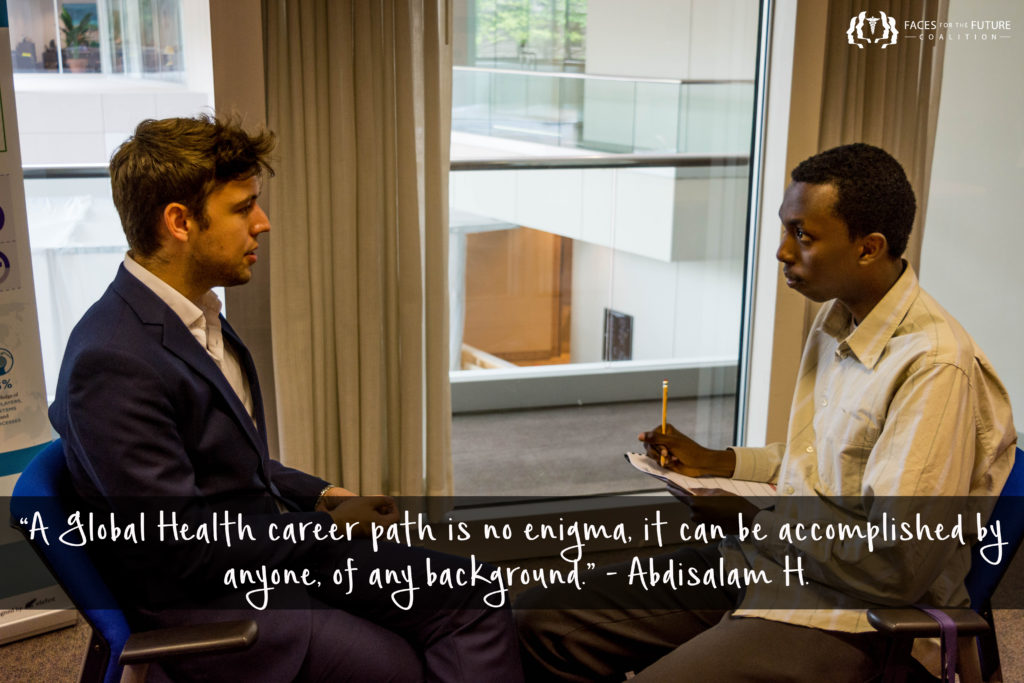
Abdisalam’s Blog
With the temperature and climate remaining fairly cool and bearable throughout our amazing trip, it, selfishly, for me at least, allowed me to thoroughly enjoy every day of a trip that solidified my love and appreciation for a career path I truly wished to pursue, but knew nothing about. My expectations soon soared as I met the different positions and areas of expertise within the Global Health leader, USAID. Security you say? There couldn’t be a LGBT sector, could there? Yes! Yes there was! Speaking to the many different professionals opened my eyes, and it was only the first day.
As a first generation Somali-American, I realized that it was false to believe that in any health field, only doctors and nurses matter. They do matter, but so do many other career paths that are much involved with Global Health. But before I go into why other careers in the field of global health matter, let me first tell you why a Global Health career is one to pursue. On the last day, two friends I met on the trip and I were fretting over the trip’s end. However, one of my friends said it didn’t have to end, telling us that the memories will forever be in her heart even as she goes back home. We later went on to discuss all the fun, exciting things we were going to tell our family members and friends once we arrive home. That Family Planning efforts in Sub-Saharan are working, that Security officials who work with Global Health should not be ignored but praised, and finally, that working with cultures and traditions different from your own can enlighten you.
But wait, why should you care about any of this if you live in America, and all of this is happening in like a faraway country, like Liberia or Somalia? Well, if any of you remember Ebola, be sure to anticipate more of those in the future. As our world and community becomes ever more connected online and offline, we, as the next generation, must prepare to tackle the huge global health concerns, ones that are close to home like the influx of illegal immigrants arriving in America and being kept in filthy, unsanitary confinements that are safe havens for diseases and in turn could spread to nearby cities. However, Global Health isn’t always skull and bones talk; it is also about empowerment and accomplishment. Twenty-six years ago, over a half of million people were dying of starvation in the horn of Africa due to constant conflict, overgrazing, and lack of international response. Many of those people who died were relatives of mine, but this story has a happy ending as that same area plagued by conflict for so long has finally been relieved of its pain. The Horn of Africa is now leading an economic boom in Africa, and it is because of the WHO and the UN, and many other health NGO’s that it ended up that way.
My love for helping people may have quadrupled as I saw the different global health professionals at work in Washington, DC. It allowed me to see that my original plan of working in a federal office in America was not a farfetched idea, but that it should not be my only plan of action. However, I now have a greater understanding of my interests concerning my career path. Thanks to the loads of talking about myself and what I want to become that got my brain into hypermode, and got it to creating a two-step plan in my career path. Something which I never done before. Another change I noticed was my close analysis of major events that were taking place across the world and the health impacts. I paid much closer attention to the tragic Syrian War, the lack of clean water in Flint, Michigan, and the spreading, less covered, violence erupting in South Sudan just two years after it seceded and its health impacts on children under 18, which cover a good portion of their entire population. I not only started covering the events, but discussed them with my family members and started to dot down the different reactions I would receive in a blog I created, nameless at the moment.
As I finally reflect on my amazing experience, I can see a new chapter beginning in my life, an exciting one, one filled with adventure never seen before, and I can assure you that you will feel the same, if not more by the first few days with the amazing staff members who allowed to open my otherwise cornered view of Global Health. A great surprise will come to many of you future Global Health Fellows that many of the traits, skills we need to perform well in the Global Health workforce we already practice in our daily lives. Many of the complaints I hear when people talk about Global Health is not the schooling, as most know that it takes the same amount of time, but the skills needed. As most see it a “unimaginable” grab, and one must know a long list of things associated with top jobs like that. But they’re wrong, as one needs only to have a good heart, the end goal in mind, and respect to the different cultures we encounter in Global Health. Many of us use these characteristics in our daily lives, when we volunteer in our local canyon clean up, we are helping with a good heart, we are respecting our other fellow volunteers who come from all over our community, and with great communication we see that the end goal is met with ease.
I learned that a Global Health career path is no enigma, it can be accomplished by anyone, of any background. As I close this blog, I want the many Fellows of GHFP-II to know of the gratitude and love I have for you all. This trip has significantly changed my life and I cannot thank you enough. As my time to begin UCLA comes ever closer, I will be sure to cherish my time in our nation’s capital while I work hard to achieve my bachelor’s degree. And to all of the future students that will experience the Global Health Youth Summit, don’t close yourself up – be open like an umbrella, ready to take down any nasty viral disease or health issue heading our way. Thank you and God Bless!
Hear from our Founding Director, Tomás Magaña, MD
Hear from our Deputy Director, Brooke Briggance
Browse Photos from the Global Health Youth Summit:
Read more about the Global Health Youth Summit:
Mentoring the Next Generation of Global Health by Global Health Fellows Program II on Exposure
